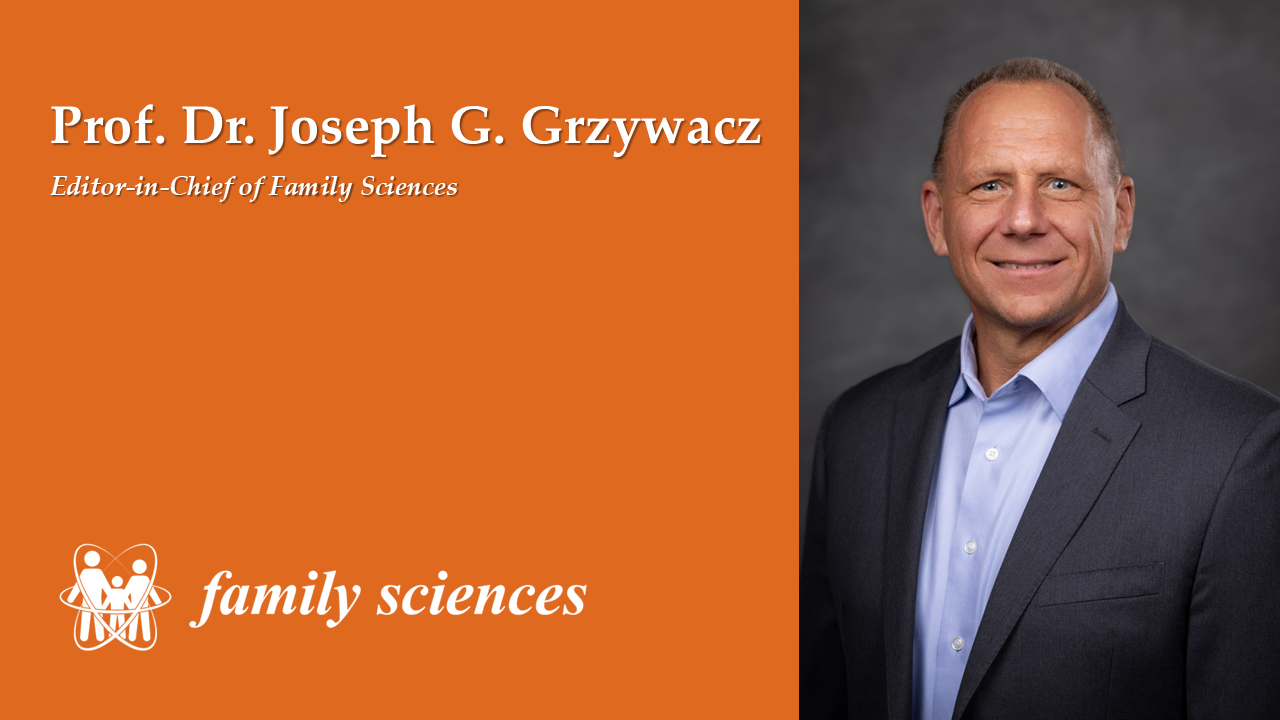Need Help?
10 September 2025
Prof. Dr. Joseph G. Grzywacz Appointed Editor-in-Chief of Family Sciences

We are pleased to announce that Prof. Dr. Joseph G. Grzywacz has been appointed Editor-in-Chief of Family Sciences (ISSN: 3042-6693).
Family Sciences welcomes manuscripts on all topics related to family, including formation, expansion, and contraction across historical, social, and developmental time; the allocation of limited resources to meet needs and wants (family economics); and all aspects of familial interactions, ranging from parenting and ritual formation/maintenance to parent–child interaction and partner violence, child abuse, and neglect.
Furthermore, Family Sciences encourages submissions of manuscripts on non-Western and Global South family experiences. Underrepresented topics include extended and multigenerational households, fictive kinship, communal caregiving, and transnational family dynamics shaped by labor migration. Family forms defined by religion, customary law, or moral obligation—such as polygynous unions, social parenthood, or informal marriages—and associated practices (e.g., arranged marriage, bride price) are frequently overlooked or mischaracterized. Additionally, the literature rarely addresses the structural impacts of familial displacement from war, genocide, and political unrest, and related topics of subsistence livelihoods or environmental interdependence.
Prof. Dr. Joseph G. Grzywacz is the Associate Dean for Research and Faculty for the College of Health and Human Sciences at San José State University, USA, with a retreat position of tenured Professor in the Department of Social Work. As the Editor-in-Chief of Family Sciences, an international open access journal, he promotes research in family science that reflects diverse perspectives and addresses issues relevant to families worldwide. His research centers on the intersections of work and family life, immigrant family dynamics, and health disparities with an output of over 250 peer-reviewed articles.
The following is a short Q&A with Prof. Dr. Joseph G. Grzywacz, who has shared his vision for the journal with us, as well as his views on the research area and open access publishing:
1. What appealed to you about the journal that made you want to become its Editor-in-Chief?
The discipline of family science is at an inflection point. It must boldly assert its relevance in a crowded scholarly landscape while retaining the critical elements of its legacy—being interdisciplinary, applied, and centered on families. At the same time, the field must be willing to address some of its internal weaknesses, such as insularity and uneven visibility beyond traditional, often discipline-specific audiences. I saw the creation of a new, global, open-access journal under the auspices of MDPI as an extraordinary opportunity to help the field take this next step. Family Sciences provides a fresh platform to elevate our scholarship, expand its reach, and grow the discipline in exciting and impactful new ways.
2. What is your vision for this journal?
My vision is for Family Sciences to become the leading platform that propels the discipline forward at this critical inflection point. The journal will preserve the strengths of our legacy—interdisciplinary, applied, family-centered inquiry—while also challenging us to confront internal weaknesses and expand our global relevance. I want Family Sciences to be bold in publishing research that pushes conceptual boundaries of the meaning at distinctive features of “family.” Family Sciences will be innovative in showcasing diverse methodologies, and intentional in amplifying voices and perspectives that have too often been marginalized. As a global, open-access journal, it has the potential to connect scholars, practitioners, and policymakers across regions and disciplines, ensuring that family-focused research not only advances theory but also addresses the most pressing challenges families face worldwide.
3. What does the future of this field of research look like?
The future of family science depends on how we respond to this inflection point. I believe the field must grow bolder in asserting its distinct contributions while remaining deeply collaborative with allied disciplines. We are uniquely positioned to address urgent issues—such as health inequities, demographic change, climate disruption, and technological transformation. Crucially, the research of the future will need to more carefully circumscribe what we mean by “family”—avoiding the error of universalism across time and space, and resisting the temptation to reduce it to sentiment or dissolve it into relativism. Instead, we must engage with the diversity of family forms and functions in ways that are both analytically precise and socially meaningful. If we embrace these directions, Family Sciences can become an indispensable voice in both scholarly and policy conversations about human well-being.
4. Do you have any suggestions for young researchers in this field?
My advice is to embrace the breadth and complexity of family science while cultivating a distinctive scholarly voice. Lean into the field’s strengths—its interdisciplinarity, applied focus, and family-centeredness—but also be fearless in addressing its blind spots. Build collaborations across boundaries, whether disciplinary, geographic, or methodological, and seek to have your work resonate beyond academia. Most importantly, keep your scholarship anchored in the lives of families, ensuring that your research not only advances theory, but also has a tangible impact in practice and policy.
5. What do you think of the development of open access in the publishing field?
Open access is central to the future of Family Sciences. As a field that seeks to improve the lives of families, our work must be accessible to practitioners, policymakers, and communities—not just to those with institutional subscriptions. The growth of open access, particularly under equitable and sustainable models, helps democratize knowledge and expand the global reach of our scholarship. Of course, it also requires vigilance to rigor and reproducibility while ensuring that costs are not unfairly shifted to scholars from under-resourced institutions or regions. I hope that open access becomes a tool to strengthen the field’s inclusivity and visibility, allowing Family Sciences to speak to and for families worldwide.
We welcome Prof. Dr. Joseph G. Grzywacz as our Editor-in-Chief and look forward to his contribution to the success of Family Sciences.

